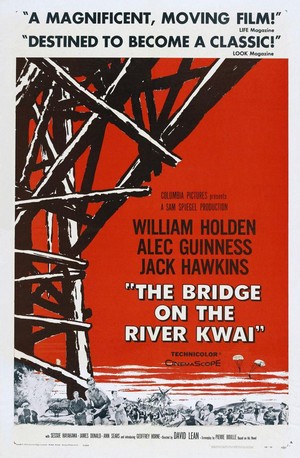
The Bridge on the River Kwai (1957)

Raiting: ![]() 8,1 /10
8,1 /10
Genre: War
Director: David Lean
Stars: William Holden, Alec Guinness and Sessue Hayakawa
Country: United Kingdom / United States
Release date: 11 October 1957
Length: 161 minutes


Raiting: ![]() 8,1 /10
8,1 /10
Genre: War
Director: David Lean
Stars: William Holden, Alec Guinness and Sessue Hayakawa
Country: United Kingdom / United States
Release date: 11 October 1957
Length: 161 minutes